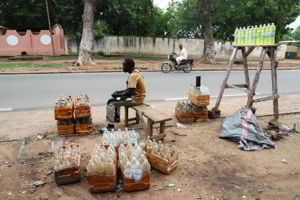Nigeria's petrol use down 28% after subsidy scrapped, regulator says
(Reuters) - Nigeria's average daily petrol consumption has fallen by 28% since President Bola Tinubu scrapped a popular but costly subsidy on the fuel at the end of May, data from the industry regulator shows.
Average daily petrol consumption fell to 48.43 million liters in June, down from the previous average of 66.9 million, according to figures released to Reuters by the Nigerian Midstream and Downstream Petroleum Regulatory Authority (NMDPRA).
A subsidy had kept prices cheap for decades in Africa's biggest economy but it became increasingly expensive for the country - the government spent $10 billion last year - leading to wider deficits and driving up government debt.
Since the subsidy was ended, a black market in neighboring Cameroon, Benin and Togo that relied on petrol smuggled from Nigeria has collapsed.
Despite having spent $2.41 B on the subsidy in the first five months, Nigeria could save up to $5.10 billion this year from scrapping the petrol subsidy and from FX reforms, the World Bank said on June 27.







Comments